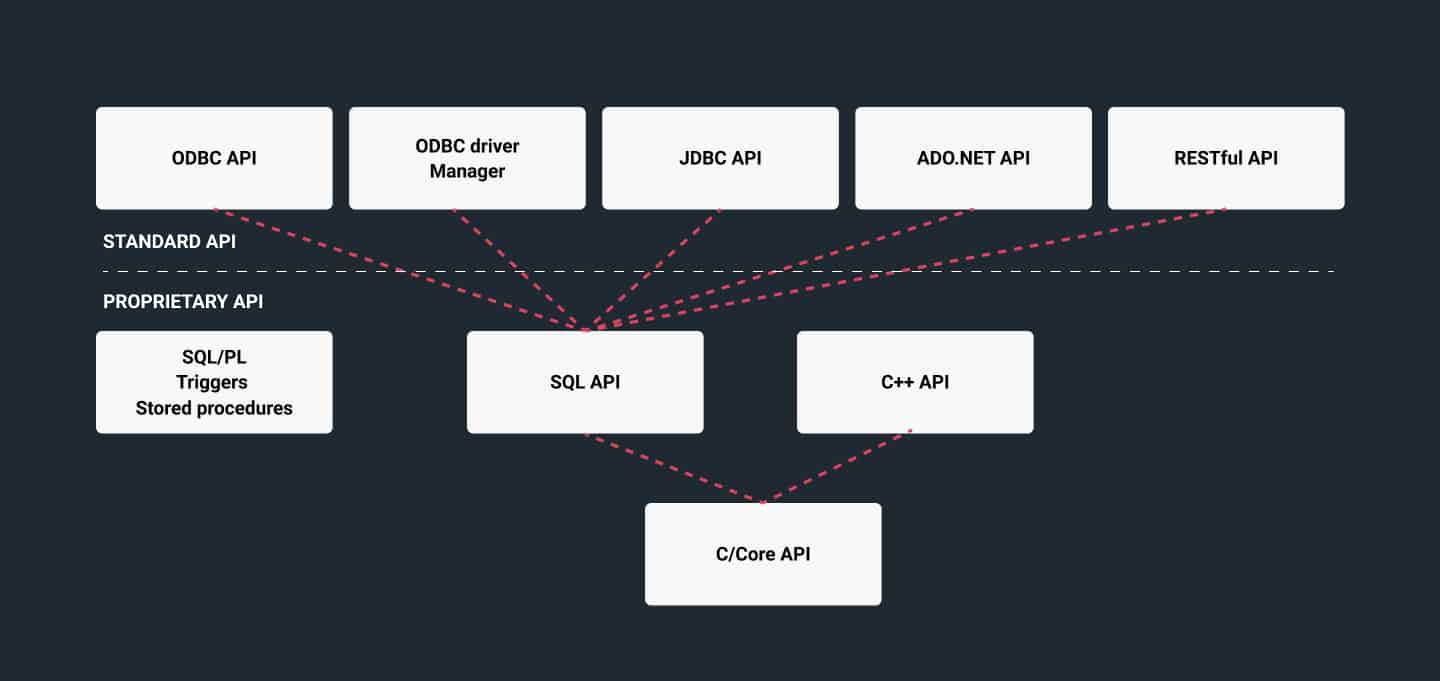RaimaDB Programming Interfaces
RaimaDB was originally a linkable library of C functions for use by C application developers. It still is, but it is also much more. The following three APIs are Raima proprietary. Other standard APIs have been supplied, as you will see below.
The following APIs are demonstrated by real code in the product.

Navigational Network-Model C API
The “classic” RaimaDB API has been used by developers for over 30 years. This low-level C API of over 200 functions gives developers complete control over all database operations. The interface breaks work down into very small units and allow developers to create database libraries that can be easily interrupted by higher-priority tasks. This API should be chosen by developers that are upgrading existing applications to the latest version of RaimaDB.
Navigation Cursor C API
The “cursor” RaimaDB API is a modern makeover of the classic RaimaDB C API. It retains the low-level control, but provides a more intuitive and easier-to-use interface. The use of cursors allows for multiple independent positions on the same set of data. This Cursor interface gives the developers the ability to work with data similar to SQL results sets without the overhead required by an interpretive interface. The Cursor API is the suggested interface for all new C- based RaimaDB applications.
C++ API
The RaimaDB C++ API is custom-generated for each database schema. A Database class is generated to provide operations on the whole database. A Cursor class is generated to operate on each table defined in the schema. Through the use of the custom classes and the ability to use Exceptions for error handling the RaimaDB C++ API is a powerful and intuitive programming interface, with expected support for try/catch functionality. The RaimaDB C++ API is the suggested interface for all C++ development.
RESTful API
The REST-ful API is a modern API designed for application developers who want to be able to view and modify database contents through HTTP GET, POST, PUT and DELETE methods with a return format of JSON. Additionally, an administrative set of APIs is exposed to allow for a quick overview of the whole RaimaDB subsystem’s status. Items such as memory usage, CPU usage, database size, and database configuration are all available through the HTTP interface. This API is perfect for the developer who is interested in web development or wants to create a quick interface to a RaimaDB database that is accessible on any platform through a web browser.
SQL C API
The RaimaDB SQL C API is the easiest way to create a C-based RaimaDB application. This API is a much-simplified version of the ODBC API. It provides the easiest and most efficient way to process SQL commands from a native C application. The RaimaDB SQL C API is the suggested interface for developers who want to utilize SQL from a C application in the most efficient manner.
Standards-Based ODBC C API
The RaimaDB ODBC C API allows a developer to build an ODBC-based application without using an ODBC driver or on platforms where no ODBC drivers are available. The interface is based on the ODBC standard and allows a C application to utilize SQL statements for data processing. The RaimaDB ODBC C API is the suggested interface for developers who want an industry-standard programming interface for SQL access.
ODBC, JDBC, ADO.NET
Raima provides ODBC, JDBC, and ADO.NET drivers for access from third-party tools, such as Access, Excel, and Visual Studio.
Get started with RaimaDB today
Try RaimaDB for free today and see how screaming fast data management can get you to market on schedule and under budget.


























